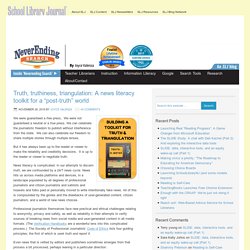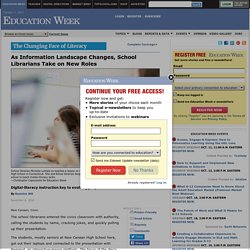

Truth, truthiness, triangulation: A news literacy toolkit for a “post-truth” world. We were guaranteed a free press, We were not guaranteed a neutral or a true press.

We can celebrate the journalistic freedom to publish without interference from the state. We can also celebrate our freedom to share multiple stories through multiple lenses. But it has always been up to the reader or viewer to make the reliability and credibility decisions. It is up to the reader or viewer to negotiate truth. News literacy is complicated. Professional journalists themselves face new practical and ethical challenges relating to anonymity, privacy and safety, as well as reliability in their attempts to verify sources of breaking news from social media and user-generated content in all media formats. Even news that is vetted by editors and publishers sometimes emerges from that process a bit processed, perhaps leaning in a particular direction.
And word choice itself is connected to truth. On news literacy Our kids need new types of filters. S disciplines. What’s going on? Fake news. Library 2.017: DIGITAL LITERACY & FAKE NEWS (A) - Google Slides. 2.017: DIGITAL LITERACY & FAKE NEWS (B) - Google Slides. How millions of kids are being shaped by know-it-all voice assistants. Kids adore their new robot siblings.

As millions of American families buy robotic voice assistants to turn off lights, order pizzas and fetch movie times, children are eagerly co-opting the gadgets to settle dinner table disputes, answer homework questions and entertain friends at sleepover parties. Many parents have been startled and intrigued by the way these disembodied, know-it-all voices — Amazon’s Alexa, Google Home, Microsoft’s Cortana — are impacting their kids’ behavior, making them more curious but also, at times, far less polite. In just two years, the promise of the technology has already exceeded the marketing come-ons. The disabled are using voice assistants to control their homes, order groceries and listen to books. Caregivers to the elderly say the devices help with dementia, reminding users what day it is or when to take medicine. For children, the potential for transformative interactions are just as dramatic — at home and in classrooms.
Naomi S. Local post_newsletter353. Bibliotech.me. As Information Landscape Changes, School Librarians Take on New Roles. School librarian Michelle Luhtala co-teaches a lesson on news analysis to 11th and 12th grade students at New Canaan High School in Connecticut.

She and fellow librarian Jacqueline Whiting frequently partner with classroom teachers at the school to teach media-literacy skills. —Christopher Capozziello for Education Week Digital-literacy instruction key to evolving job portfolio New Canaan, Conn. The school librarians entered the civics classroom with authority, calling the students by name, cracking jokes, and quickly pulling up their presentation. The students, mostly seniors at New Canaan High School here, got out their laptops and connected to the presentation with Nearpod, an interactive-lesson platform. It used to be easy: Newspapers clearly marked pages as "opinion" or "news. " That was the point of the day's lesson, led by New Canaan High librarians Michelle Luhtala and Jacquelyn Whiting and civics teacher Kristine Goldhawk.
After class, Whiting smiled, reflecting on the lesson.